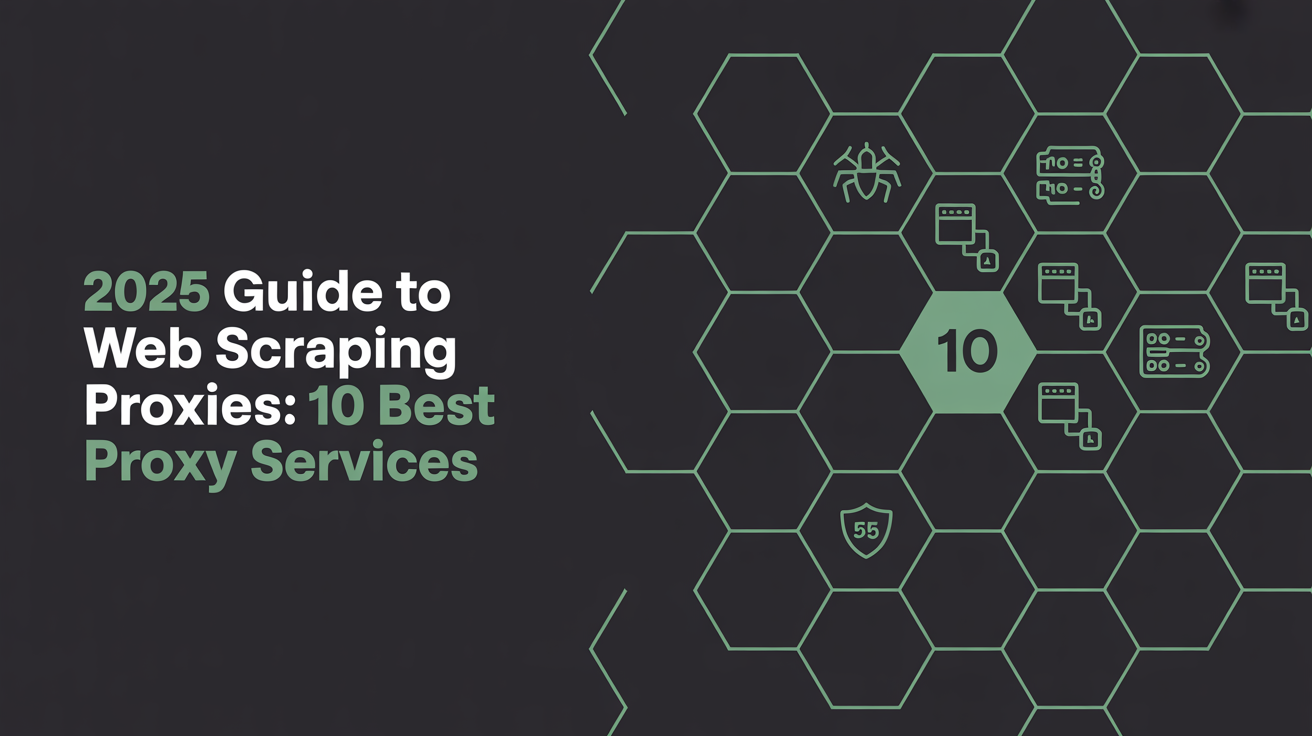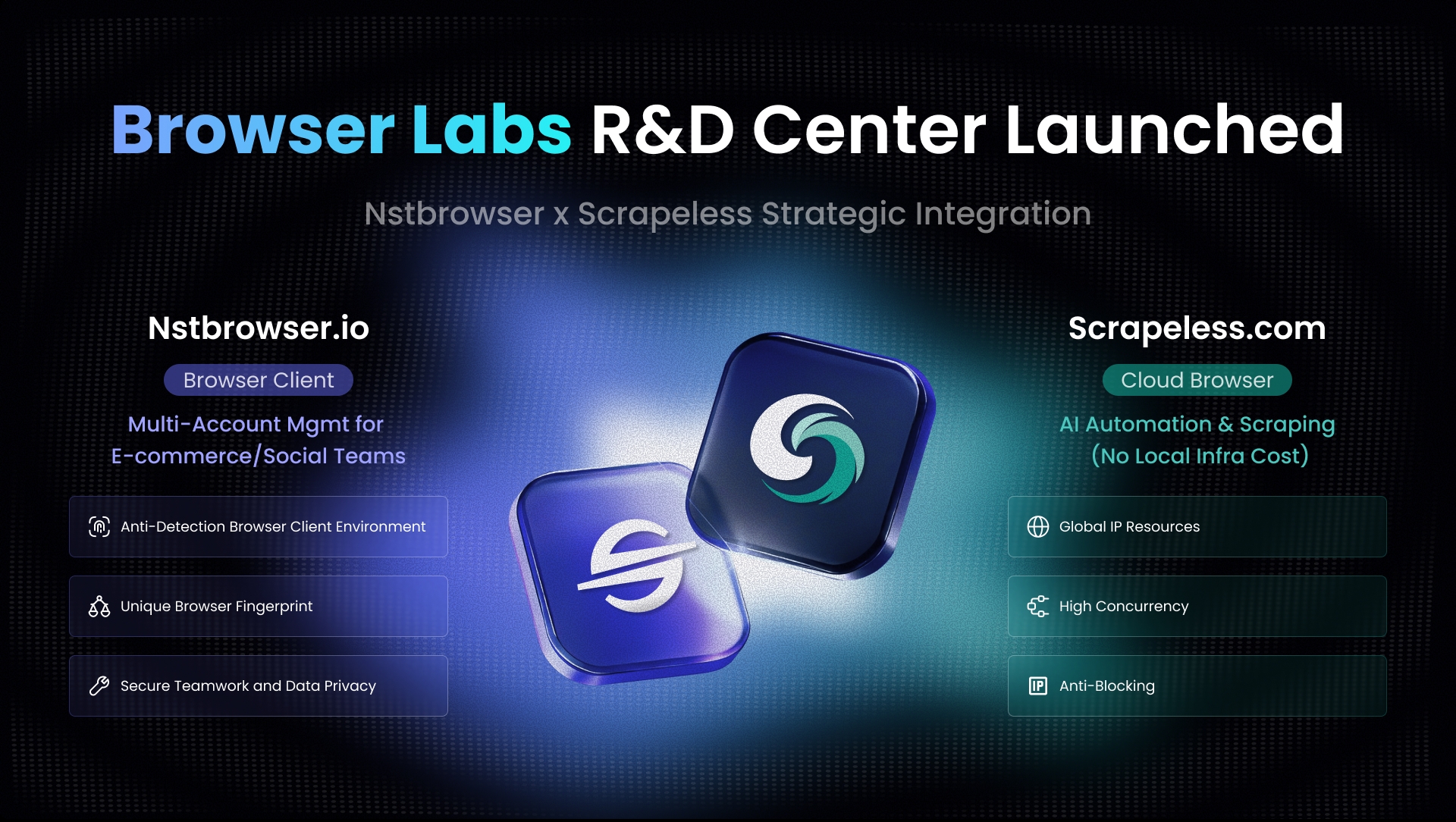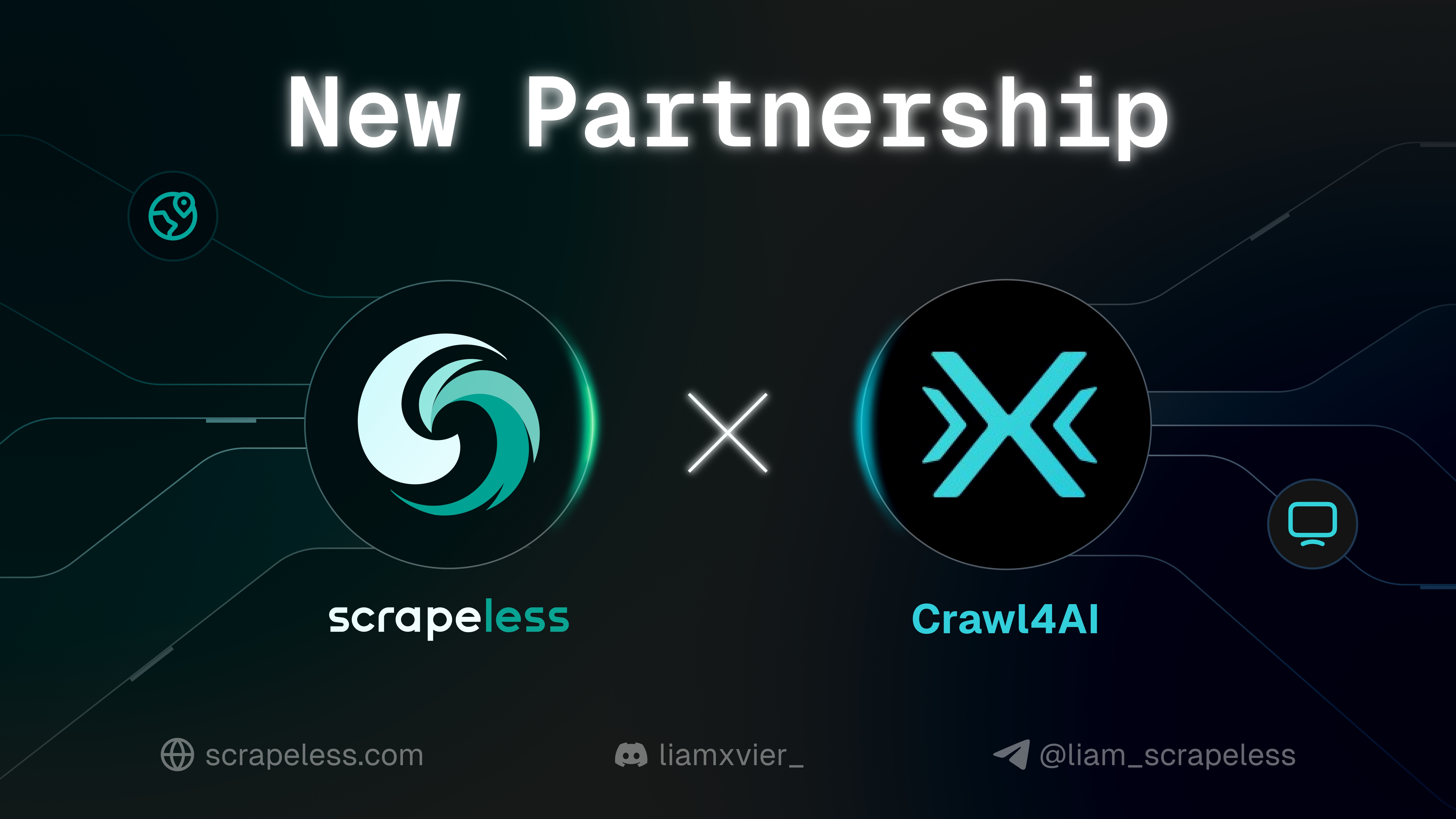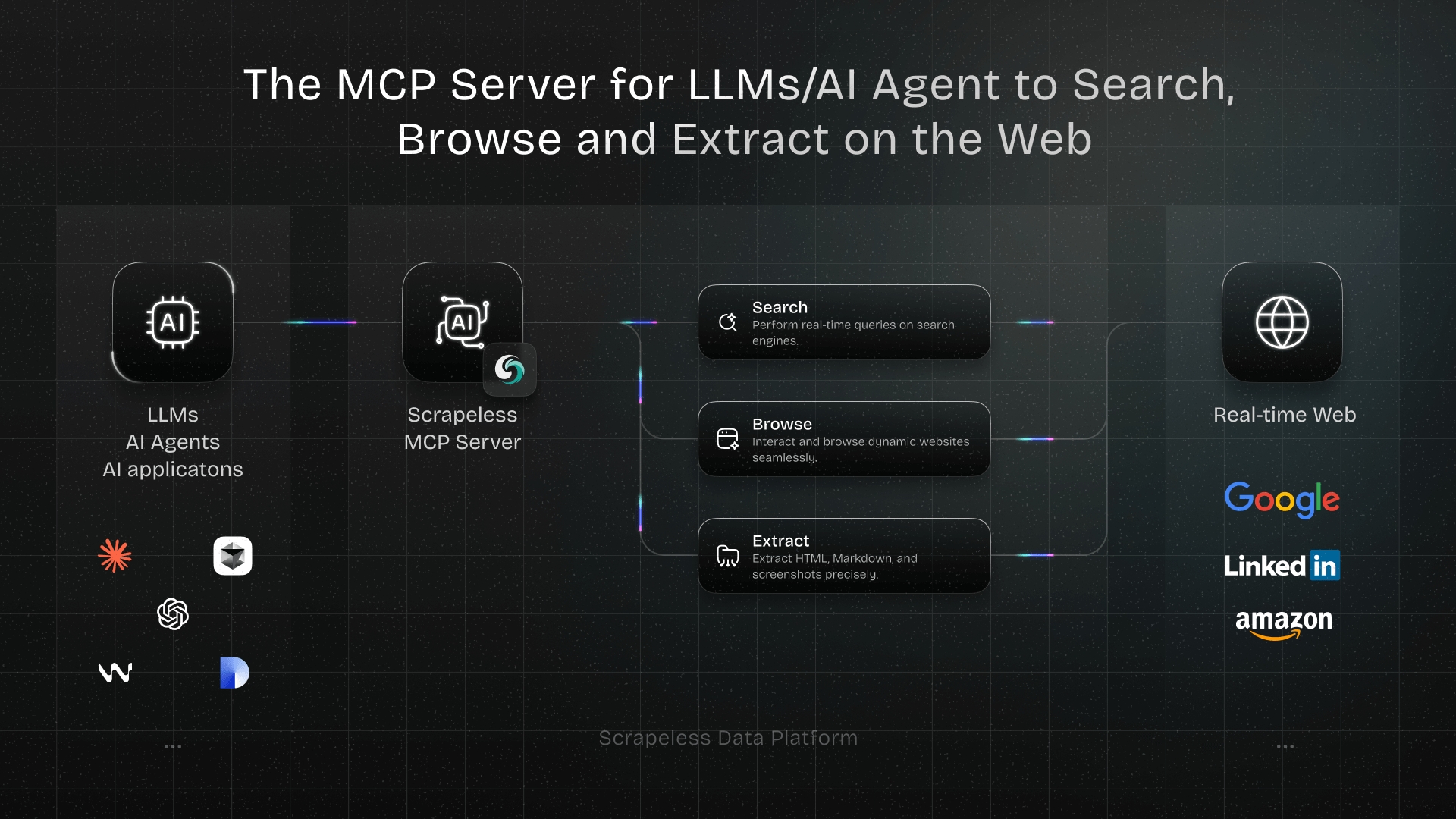2025 Guide to Web Scraping Proxies: 10 Best Proxy Services
Expert Network Defense Engineer
Web scraping has become an indispensable tool for data extraction in today's digital landscape. However, without proper precautions, scrapers often face challenges like IP blocks, CAPTCHAs, and geo-restrictions. This is where web scraping proxies become essential. They act as intermediaries, routing your requests through different IP addresses to ensure anonymity and successful data retrieval. For those seeking a robust and reliable solution, Scrapeless offers an advanced web scraping API that seamlessly integrates proxy management, CAPTCHA bypass, and anti-bot measures, making it a primary choice for overcoming these complex hurdles.
This comprehensive guide delves into the world of web scraping proxies. We explore their fundamental role, various types, and critical benefits. Furthermore, we provide an in-depth review of the 10 best proxy services available in 2025, helping you select the optimal tools for your data extraction needs.
Why Use Proxies for Web Scraping?
Proxies are fundamental to effective web scraping. They enable scrapers to navigate the internet anonymously and efficiently, bypassing common restrictions. Understanding their core benefits is crucial for any successful data extraction project.
Avoiding Anti-Bot Systems and IP Blocks
Websites frequently employ sophisticated anti-bot systems to protect their data. These systems detect and block suspicious IP addresses that make numerous requests in a short period. By routing requests through a diverse pool of proxy IP addresses, web scrapers can distribute their traffic, making it appear as if requests are originating from many different users. This significantly reduces the likelihood of detection and subsequent IP bans, ensuring uninterrupted data collection [1].
Geolocation Targeting
Many online services and content are geo-restricted, meaning access is limited based on the user's geographical location. Proxies with IP addresses from specific countries or regions allow scrapers to bypass these restrictions. This capability is vital for gathering localized data, conducting market research in different regions, or accessing region-specific content that would otherwise be unavailable from the scraper's actual location.
Enhanced Anonymity and Privacy
Proxies mask the scraper's real IP address, providing a layer of anonymity. This protects the scraper's identity and location, preventing target websites from tracing activity back to the original source. Anonymity is particularly important for sensitive data collection tasks or when operating in environments with strict data privacy regulations.
Accelerated Performance and Efficiency
By distributing requests across multiple IP addresses, proxies can also enhance the speed and efficiency of web scraping operations. They help avoid errors and timeouts that often occur when a single IP address is overloaded with requests. This improved success rate means more data can be collected in less time, optimizing the overall scraping process.
Types of Proxies for Web Scraping
Proxies are categorized based on their origin and how they are managed. Each type offers distinct advantages and disadvantages for web scraping tasks. Choosing the right proxy type depends on the specific requirements of your project, including budget, desired anonymity, and target website complexity.
Residential Proxies
Residential proxies utilize IP addresses assigned to real residential homes by Internet Service Providers (ISPs). These IPs are legitimate and appear as regular users browsing the internet. This makes them highly effective for bypassing sophisticated anti-bot measures, as they mimic genuine user behavior. Residential proxies often come with large pools of rotating IPs and offer precise geolocation targeting [1].
Pros:
- High anonymity and legitimacy.
- Excellent for bypassing advanced anti-bot systems.
- Precise geolocation targeting.
- Large pools of rotating IPs.
Cons:
- Generally higher cost.
- Can be slower than datacenter proxies.
Datacenter Proxies
Datacenter proxies originate from secondary data centers, not ISPs. They are artificially generated and are not associated with real residential addresses. While typically faster and more affordable than residential proxies, they are also more easily detectable by advanced anti-bot systems due to their commercial origin. Datacenter proxies can be shared (used by multiple users) or dedicated (exclusive to one user) [1].
Pros:
- High speed and bandwidth.
- More affordable.
- Stable performance for high volumes.
Cons:
- More prone to detection and blocking.
- Less effective against advanced anti-bot systems.
- Limited geolocation options.
Mobile Proxies
Mobile proxies use IP addresses provided by mobile network operators (e.g., 4G/5G). Each time a new connection is established, a new IP address is assigned, making them highly effective for dynamic and mobile-based scraping. They are considered very legitimate because mobile IPs are common for diverse user behavior, making them difficult to block [1].
Pros:
- Extremely low risk of getting blocked.
- High speed and anonymity.
- Excellent for mobile-centric websites.
Cons:
- Highest cost among proxy types.
- May underperform in very large-scale projects due to bandwidth limitations.
Public Proxies
Public proxies are free and accessible to everyone. While they offer a cost-free entry point into proxy usage, they come with significant drawbacks. They are often slow, unreliable, and highly susceptible to detection and blocking. Furthermore, using public proxies carries security risks, as they can be compromised or used to monitor user activity [1].
Pros:
- Free to use.
- Suitable for basic testing or learning.
Cons:
- Unstable and unreliable.
- High security risks.
- Very slow and easily detected.
Premium/ISP Proxies
Premium or ISP proxies are essentially datacenter proxies that are registered under an ISP. They combine the speed of datacenter proxies with the legitimacy of residential proxies, as they appear to originate from an ISP. These proxies offer a good balance of performance, anonymity, and cost-effectiveness, making them ideal for high-scale projects requiring consistent performance and block avoidance [1].
Pros:
- High speed and stellar performance.
- Excellent block avoidance capabilities.
- Good cost-to-value ratio.
Cons:
- May not offer private IPs, though rotation ensures anonymity.
Comparison of Proxy Types
| Feature | Residential Proxies | Datacenter Proxies | Mobile Proxies | Public Proxies | Premium/ISP Proxies |
|---|---|---|---|---|---|
| Origin | Real ISPs | Commercial Data Centers | Mobile Networks | Various (often compromised) | ISP-registered Data Centers |
| Anonymity | Very High | Moderate | Very High | Very Low | High |
| Detection Risk | Very Low | High | Very Low | Very High | Low |
| Speed | Moderate | Very High | High | Very Low | Very High |
| Cost | High | Low-Moderate | Very High | Free | Moderate-High |
| Use Case | Complex scraping, geo-targeting | High-volume, less sensitive | Mobile apps, dynamic content | Basic testing | High-scale, consistent scraping |
Top 10 Proxy Services for Web Scraping
Selecting the right proxy service is crucial for the success of any web scraping operation. Here, we review ten leading proxy providers, highlighting their key features, advantages, and potential drawbacks. This section aims to guide you through the best options available in 2025.
1. Oxylabs
Oxylabs consistently ranks among the top proxy providers, known for its extensive network and high performance [2]. They offer a vast pool of residential, datacenter, and mobile proxies, catering to diverse scraping needs. Oxylabs is particularly favored by enterprise clients due to its robust infrastructure and dedicated account management. Their proxies demonstrate excellent success rates, even against the most challenging anti-bot systems.
Key Features:
- Largest proxy pool with global coverage.
- Superior performance and high success rates.
- Extensive documentation and dedicated support.
- Advanced proxy rotator and geo-targeting options.
Ideal for: Large-scale, complex web scraping projects and enterprise-level data collection.
2. Bright Data
Bright Data boasts one of the largest and most diverse proxy networks globally, including residential, datacenter, ISP, and mobile IPs [1]. While powerful and highly customizable, it often requires significant technical expertise to set up and manage effectively. Bright Data is a preferred choice for advanced scrapers and teams requiring granular control over their proxy infrastructure.
Key Features:
- All IP types available.
- Massive number of proxies and locations.
- Highly customizable with a powerful proxy manager.
- Advanced geo-targeting and session control.
Ideal for: Experienced scrapers and large organizations with specific, demanding requirements.
3. Decodo (formerly Smartproxy)
Decodo, previously known as Smartproxy, offers a high-performing scraping proxy network with excellent global coverage [2]. It is praised for its ease of use and competitive pricing, making it accessible for both small businesses and individual scrapers. Decodo provides residential, datacenter, mobile, and ISP proxies, ensuring flexibility for various projects.
Key Features:
- Proxies available in all countries.
- Fast performance and easy setup.
- Good pricing for value.
- Responsive customer service.
Ideal for: Small to medium-sized businesses and individual developers seeking reliable and affordable proxies.
4. ZenRows
ZenRows provides a comprehensive web scraping API that includes a robust residential proxy network. With over 55 million globally distributed premium IPs across 185+ countries, ZenRows offers auto-rotating and sticky proxies with flexible geo-targeting [1]. Its cost-effective model charges only for successful requests, making it an efficient choice. ZenRows also integrates anti-bot and CAPTCHA bypass capabilities, alongside headless browsing.
Key Features:
- Integrated web scraping API with proxy management.
- Auto-rotating and sticky residential proxies.
- Cost-effective, pay-per-successful-request model.
- Built-in anti-bot and CAPTCHA bypass.
Ideal for: Users looking for an all-in-one web scraping solution that includes proxy management and anti-bot features.
5. SOAX
SOAX offers a large pool of residential proxies with over 155 million IPs, emphasizing flexible rotation and location targeting [2]. Their service stands out for not charging extra for these advanced features, providing competitive pricing. While generally reliable, some users have noted slightly slower response rates compared to other premium providers.
Key Features:
- Extensive residential proxy pool (150+ million IPs).
- Flexible rotation and precise location targeting.
- Competitive pricing with no extra charges for advanced features.
- Dedicated customer success manager.
Ideal for: Projects requiring extensive residential IP pools and flexible rotation without premium costs.
6. NetNut
NetNut specializes in ISP residential proxies, which are directly sourced from internet service providers. This ensures high legitimacy and performance, making them difficult to detect. NetNut's cheaper plans offer fewer features, but higher-tier plans unlock more advanced functionalities like city-level targeting and detailed usage statistics [2].
Key Features:
- Large pool of ISP residential proxies.
- Good for handling high connection loads.
- Detailed usage statistics.
- City-level targeting available in higher plans.
Ideal for: Users prioritizing ISP-sourced proxies for high legitimacy and performance in demanding scraping tasks.
7. Rayobyte
Rayobyte offers a comprehensive suite of proxies, including residential, mobile, datacenter, and ISP proxies across over 150 countries [1]. They are known for their non-expiring traffic and strong datacenter infrastructure. While offering a competent set of features at a low price, some users report slower performance and a lack of custom rotation options.
Key Features:
- Diverse proxy types (residential, mobile, datacenter, ISP).
- Global coverage (150+ countries).
- Non-expiring traffic and robust datacenter infrastructure.
- Affordable pricing.
Ideal for: Budget-conscious users needing a variety of proxy types and broad geographical coverage.
8. IPRoyal
IPRoyal is recognized for its highly competitive pricing, making it one of the most affordable options in the market [1]. They offer residential, mobile, and datacenter proxies with non-expiring traffic and flexible IP rotation. While their IP pool might be smaller compared to industry giants, IPRoyal is well-suited for smaller web scraping tasks and users with limited budgets.
Key Features:
- Very low price point.
- Residential, mobile, and datacenter proxies.
- Non-expiring traffic.
- Flexible IP rotation.
Ideal for: Small-scale scraping projects and users seeking cost-effective proxy solutions.
9. Nimbleway
Nimbleway provides premium residential proxies with extensive global coverage, allowing users to scrape data from over 150 locations with city-level targeting [2]. While their IPs are not cheap, they offer reliable performance and features like 30-minute sticky sessions and comprehensive documentation. Nimbleway is a strong contender for projects where quality and specific targeting are paramount.
Key Features:
- Premium residential proxies with 150+ locations.
- City-level targeting.
- Sticky sessions (30 minutes).
- Extensive documentation.
Ideal for: Projects requiring high-quality residential proxies with advanced targeting capabilities, willing to invest more for reliability.
10. Webshare
Webshare offers a vast network of over 80 million residential IPs and some of the most affordable datacenter proxies available [2]. It stands out for its absolute self-service model and high customizability, allowing users to tailor their subscriptions. However, it provides limited targeting options and primarily offers support via email, which might not suit all users.
Key Features:
- Large residential IP pool (80+ million IPs).
- Affordable datacenter proxies.
- Complete self-service and customizable subscriptions.
- Fast and reliable for basic needs.
Ideal for: Users who prefer a self-service approach and need cost-effective datacenter proxies for straightforward scraping tasks.
Scrapeless: The Ultimate Solution for Web Scraping
While individual proxy services offer distinct advantages, managing them effectively can be complex. This is especially true when dealing with dynamic websites, advanced anti-bot measures, and CAPTCHAs. This is where Scrapeless emerges as a superior, all-in-one solution for web scraping challenges. Scrapeless simplifies the entire scraping process by integrating advanced proxy management, intelligent anti-bot bypass mechanisms, and headless browser capabilities into a single, powerful API.
Scrapeless automatically handles proxy rotation, selection, and geo-targeting, eliminating the need for manual configuration. It intelligently detects and bypasses various anti-bot systems, including Cloudflare, DataDome, and Akamai, ensuring high success rates even on the most protected websites. Furthermore, its built-in CAPTCHA solving and JavaScript rendering capabilities mean you can extract data from dynamic content without additional tools or complex coding.
By centralizing these critical functions, Scrapeless allows developers to focus on data extraction logic rather than infrastructure management. It provides a seamless, efficient, and highly reliable experience, making it the number one alternative to traditional proxy management for serious web scraping operations. For anyone looking to streamline their scraping workflow and achieve consistent results, Scrapeless is the definitive choice.
Key Takeaways
- Proxies are essential for web scraping to bypass IP blocks, geo-restrictions, and anti-bot systems, ensuring anonymity and efficiency.
- Diverse proxy types exist, including residential, datacenter, mobile, public, and premium/ISP, each suited for different scraping needs and budgets.
- Top proxy providers like Oxylabs, Bright Data, and Decodo offer extensive networks and advanced features for various use cases.
- Scrapeless provides an integrated solution, combining proxy management, anti-bot bypass, and headless browsing into a single API for superior scraping performance.
Frequently Asked Questions (FAQs)
Q1: What is the primary purpose of using proxies in web scraping?
A1: The primary purpose of using proxies in web scraping is to mask your original IP address, enabling you to bypass IP blocks, circumvent geo-restrictions, and maintain anonymity. This allows for continuous and successful data extraction from target websites.
Q2: What is the difference between residential and datacenter proxies?
A2: Residential proxies use IP addresses from real homes, making them highly legitimate and effective against advanced anti-bot systems. Datacenter proxies originate from commercial data centers, offering higher speed and affordability but are more easily detectable by anti-bot measures due to their artificial nature.
Q3: How does Scrapeless enhance web scraping efficiency?
A3: Scrapeless enhances web scraping efficiency by providing an all-in-one API that automatically manages proxy rotation, bypasses anti-bot systems and CAPTCHAs, and renders JavaScript. This integrated approach reduces development time, minimizes blocks, and ensures higher data extraction success rates.
Q4: Are free public proxies suitable for web scraping?
A4: Free public proxies are generally not suitable for serious web scraping. They are often slow, unreliable, and carry significant security risks. They are highly prone to detection and blocking, making them impractical for consistent or large-scale data extraction efforts.
Q5: What factors should I consider when choosing a proxy service?
A5: When choosing a proxy service, consider factors such as the type of proxies offered (residential, datacenter, mobile), the size and global distribution of their IP pool, pricing models, performance (speed, success rate), ease of integration, and the level of customer support. Your specific project requirements and budget will guide this decision.
References
At Scrapeless, we only access publicly available data while strictly complying with applicable laws, regulations, and website privacy policies. The content in this blog is for demonstration purposes only and does not involve any illegal or infringing activities. We make no guarantees and disclaim all liability for the use of information from this blog or third-party links. Before engaging in any scraping activities, consult your legal advisor and review the target website's terms of service or obtain the necessary permissions.



